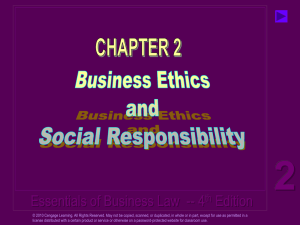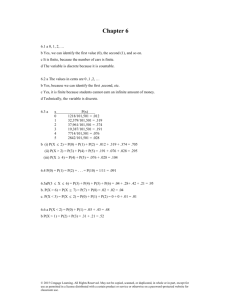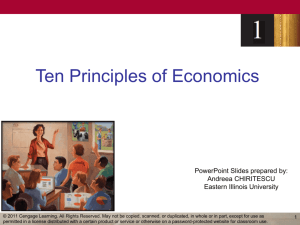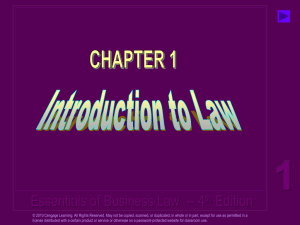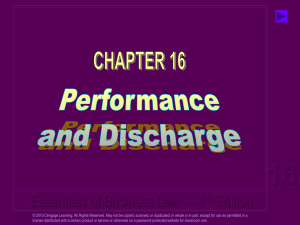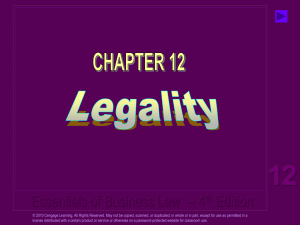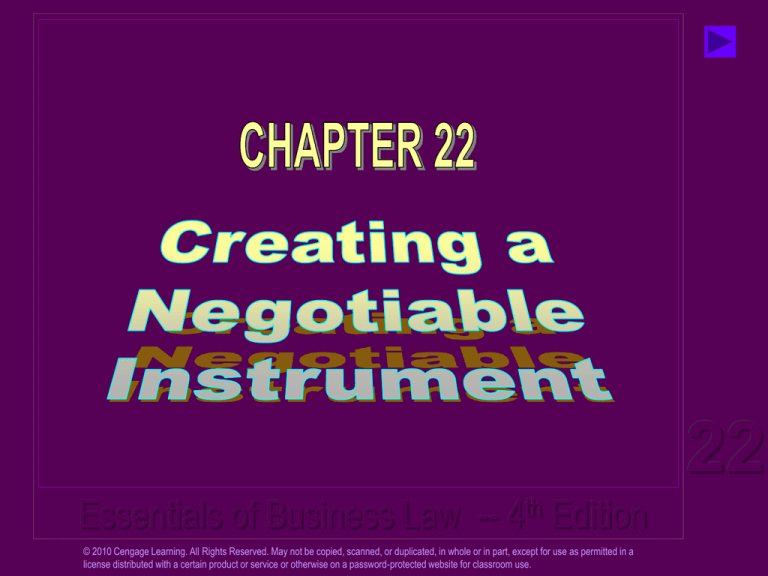
22
Essentials of Business Law -- 4th Edition
© 2010 Cengage Learning. All Rights Reserved. May not be copied, scanned, or duplicated, in whole or in part, except for use as permitted in a
license distributed with a certain product or service or otherwise on a password-protected website for classroom use.
Click your mouse
anywhere on the
screen when you are
ready to advance the
text within each slide.
After the starburst appears behind the blue
triangles, the slide is completely shown.
You may click one of the blue triangles to
move to the next slide or the previous slide.
Essentials of Business Law -- 4th Edition
© 2010 Cengage Learning. All Rights Reserved. May not be copied, scanned, or duplicated, in whole or in part, except for use as permitted in a
license distributed with a certain product or service or otherwise on a password-protected website for classroom use.
22
“A negotiable bill or note is a
courier without luggage.”
John B. Gibson,
Overton v. Tyler, 1846
22
Essentials of Business Law -- 4th Edition
© 2010 Cengage Learning. All Rights Reserved. May not be copied, scanned, or duplicated, in whole or in part, except for use as permitted in a
license distributed with a certain product or service or otherwise on a password-protected website for classroom use.
Commercial paper is a contract to pay
money.
It can be:
• A Substitute for Money
• A Loan of Money
22
Essentials of Business Law -- 4th Edition
© 2010 Cengage Learning. All Rights Reserved. May not be copied, scanned, or duplicated, in whole or in part, except for use as permitted in a
license distributed with a certain product or service or otherwise on a password-protected website for classroom use.
The possessor of a piece of commercial
paper has an unconditional right to be
paid, as long as:
• the paper is negotiable;
• it has been negotiated to the possessor;
• the possessor is a holder in due course;
and
• the issuer cannot claim any of the limited
number of “real” defenses.
Essentials of Business Law -- 4th Edition
© 2010 Cengage Learning. All Rights Reserved. May not be copied, scanned, or duplicated, in whole or in part, except for use as permitted in a
license distributed with a certain product or service or otherwise on a password-protected website for classroom use.
22
Note (also called a promisory note) is a
promise to pay money.
• Certificate of Deposit (CD) is a note made
by a bank.
Draft is an order directing someone else
to pay money for you (e.g., checks).
• Cashier’s check -- a draft drawn by a bank
on its own account.
• Traveler’s check -- a draft issued by and
paid by the same company (such as
American Express)
Essentials of Business Law -- 4th Edition
© 2010 Cengage Learning. All Rights Reserved. May not be copied, scanned, or duplicated, in whole or in part, except for use as permitted in a
license distributed with a certain product or service or otherwise on a password-protected website for classroom use.
22
The possessor of non-negotiable
commercial paper has the same rights-no more, no less--as the person who
made the original contract.
The possessor of negotiable
commercial paper has more rights than
the person who made the original
contract.
22
Essentials of Business Law -- 4th Edition
© 2010 Cengage Learning. All Rights Reserved. May not be copied, scanned, or duplicated, in whole or in part, except for use as permitted in a
license distributed with a certain product or service or otherwise on a password-protected website for classroom use.
The Instrument Must:
• Be in Writing.
• Be Signed by the Maker or Drawer.
• Contain an Unconditional Promise or Order
to Pay.
• State a Definite Amount of Money.
• Be Payable on Demand or at a Definite
Time.
• Be Payable to Order or to Bearer.
Essentials of Business Law -- 4th Edition
© 2010 Cengage Learning. All Rights Reserved. May not be copied, scanned, or duplicated, in whole or in part, except for use as permitted in a
license distributed with a certain product or service or otherwise on a password-protected website for classroom use.
22
Trade acceptance -- draft drawn by a
seller of goods on the buyer and payable
to the sell or some third party
Sight draft -- payable on demand
Time draft -- payable at some particular
time in the future
Order paper -- payable to the named
person or anyone designated by that
named person
Bearer paper -- payable to anyone in
possession of the paper
Essentials of Business Law -- 4th Edition
© 2010 Cengage Learning. All Rights Reserved. May not be copied, scanned, or duplicated, in whole or in part, except for use as permitted in a
license distributed with a certain product or service or otherwise on a password-protected website for classroom use.
22
When terms contradict, three rules
apply:
• Words take precedence over numbers.
• Handwritten terms prevail over typewritten
terms.
• Typed terms prevail over printed terms.
When the interest rate is not specified,
a court will apply the same rate used
with court-ordered judgments.
Essentials of Business Law -- 4th Edition
© 2010 Cengage Learning. All Rights Reserved. May not be copied, scanned, or duplicated, in whole or in part, except for use as permitted in a
license distributed with a certain product or service or otherwise on a password-protected website for classroom use.
22
To be negotiated, order paper must
first be indorsed and then delivered to
the transferee.
Bearer paper must simply be
delivered to the transferee; no
indorsement is required.
22
Essentials of Business Law -- 4th Edition
© 2010 Cengage Learning. All Rights Reserved. May not be copied, scanned, or duplicated, in whole or in part, except for use as permitted in a
license distributed with a certain product or service or otherwise on a password-protected website for classroom use.
Order paper must be indorsed; bearer
paper does not require indorsement.
An indorsement is the signature of the
payee.
• Blank Indorsement -- does not designate a
new payee; becomes bearer paper.
• Special Indorsement -- does designate a new
payee; only that person may cash the check.
• Restrictive Indorsement -- limits the check to
one particular use (such as deposit into a
particular account).
Essentials of Business Law -- 4th Edition
© 2010 Cengage Learning. All Rights Reserved. May not be copied, scanned, or duplicated, in whole or in part, except for use as permitted in a
license distributed with a certain product or service or otherwise on a password-protected website for classroom use.
22
A holder in due course has an
automatic right to receive payment for a
negotiable instrument (unless issuer
can claim one of a few “real” defenses).
Requirements for Holder in Due Course
• Under §3-302 of the UCC, a holder in due
course is a holder who have given value for
the instrument, in good faith, without notice
of outstanding claims or other defects.
Essentials of Business Law -- 4th Edition
© 2010 Cengage Learning. All Rights Reserved. May not be copied, scanned, or duplicated, in whole or in part, except for use as permitted in a
license distributed with a certain product or service or otherwise on a password-protected website for classroom use.
22
The instrument is overdue
The instrument is dishonored
The instrument is altered, forged, or
incomplete
The holder has notice of certain claims
or disputes
22
Essentials of Business Law -- 4th Edition
© 2010 Cengage Learning. All Rights Reserved. May not be copied, scanned, or duplicated, in whole or in part, except for use as permitted in a
license distributed with a certain product or service or otherwise on a password-protected website for classroom use.
Under the shelter rule, the transferor of
an instrument passes on all of his
rights.
When a holder in due course transfers
an instrument, the recipient acquires all
the same rights even if she is made a
holder in due course herself.
22
Essentials of Business Law -- 4th Edition
© 2010 Cengage Learning. All Rights Reserved. May not be copied, scanned, or duplicated, in whole or in part, except for use as permitted in a
license distributed with a certain product or service or otherwise on a password-protected website for classroom use.
Real and personal defenses are valid
against an ordinary holder; only real
defenses can be used against a holder in
due course.
Real Defenses
• Include: Forgery, Bankruptcy, Minority,
Alteration, Duress, Mental Incapacity,
Illegality, and Fraud in the Execution.
Personal Defenses
• Include Breach of Contract, Lack of
Consideration, Prior Payment, Unauthorized
Completion, Fraud in the Inducement, and
Non-Delivery. (Claims in Recoupment have a
similar impact as a defense.)
Essentials of Business Law -- 4th Edition
© 2010 Cengage Learning. All Rights Reserved. May not be copied, scanned, or duplicated, in whole or in part, except for use as permitted in a
license distributed with a certain product or service or otherwise on a password-protected website for classroom use.
22
A consumer credit contract is one in which
the seller is also the lender.
In such cases, the Federal Trade
Commission requires a specifically-worded
notice to be included on the contract,
making it non-negotiable.
22
Essentials of Business Law -- 4th Edition
© 2010 Cengage Learning. All Rights Reserved. May not be copied, scanned, or duplicated, in whole or in part, except for use as permitted in a
license distributed with a certain product or service or otherwise on a password-protected website for classroom use.
22
Essentials of Business Law -- 4th Edition
© 2010 Cengage Learning. All Rights Reserved. May not be copied, scanned, or duplicated, in whole or in part, except for use as permitted in a
license distributed with a certain product or service or otherwise on a password-protected website for classroom use.


